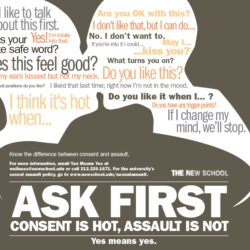
While the “Safe, Sane, and Consensual” slogan has served the kink community well, more and more people are preferring to include the concept of “personal responsibility”. Even outside of kink people choose to do “unsafe” activities for fun – such as mountain biking – but the risk factor is reduced by taking simple personal precautions: a helmet. Looking at the route beforehand. Biking with a buddy, especially one who is more experienced. This keeps both the thrill and the biker alive.
How does a personally responsible kinkster act? That’s most likely an individual choice, but here are some videos about negotiation, consent, and community that can provide some useful tools.
The overarching theme that differentiates kink from abuse, of course, is consent. A ”community of consent” is described by Dr. Jill Weinberg in a free video lecture. It’s a long lecture, but that’s because, as Dr. Weinberg says, “Defining consent is difficult because our “general consensus” definition of consent is nothing more than intuition…It is easier to discern what consent is not than to determine what consent is.” In fact, in the kink community, with the emphasis on negotiation, boundaries, and community involvement, consent issues are perhaps more clear-cut than in everyday life – but they can still be complex. How can individuals work together to create a community that reduces the risk of consent violations?
Understanding basic dungeon do’s and don’ts is one place to start. Many of these are the same as the things one learns in

kindergarten: don’t touch other people or their things without asking. Talk nicely. Clean up after you’re done playing. Mollena Williams and Lee Harrington, the authors of “Playing Well With Others”, give a broad outline of general behaviors, but it’s important to remember that individual places have different rules. For example, at a particular party at the Center for Sex Positive Culture in Seattle, they introduced a red wristband for people who did not want to be approached for play. Unfortunately the protocol wasn’t well-understood or respected and people who wore it were propositioned. Is this rudeness? Ignorance? Or predatory behavior? It’s likely that with more community education and emphasis the red band could become as ubiquitous as “SSC”.
Some aspects of consent are different for men than women, Harold Henry explains in his video, due to the cultural stereotypes and roles. Instead of trying to be the “Mr. Grey” type of dominant in the hopes of attracting a submissive, he recommends the opposite: “Clear and honest communication are key. Being the kind of pushy predator that the mainstream media promotes won’t get you anywhere.” While it’s not specific to male-bodied kinksters, this is part of the very important concept that personal responsibility is more than keeping yourself safe from aggressors – it’s also about educating yourself on how not to be an aggressor in the first place.
It is important to remember that there’s a difference between “assertive” and “aggressive”. Another common stereotype is that the top or dominant player has to lead the negotiations. Shay has a whole list of assertive negotiation tips for submissives that are the epitome of personal responsibility. It’s entirely possible to both be submissive and ask for what you want and need in any kind of play.
Part of personal responsibility is understanding what your own personal needs are, and that’s why The Control Enthusiast and Graydancer have several videos specifically tailored to rope negotiation. All too often negotiations are limited to medical issues and sexual contact – which are important, but which miss the broader spectrum of possibilities in a scene. How are you hoping to feel during this scene? How do you want to feel afterwards? Even more usually forgotten: how do you want your partner to feel?
The first encounter with a potential partner can set the tone of an entire relationship, and Kitty Stryker – a well-known advocate for improving consent in the community – talks about how the kinds of words you use are important, as well as being indicators of how your potential partner views consent. It’s important to remember that as a top or a bottom there is no obligation to continue a negotiation if your gut tells you that things are not what you’re looking for. That doesn’t mean that the other person is bad, necessarily – it just means that they and you respect your instincts and desires. Learning how to gracefully accept a “no” is a great skill to develop in negotiation.
It’s important to remember is that personal responsibility is a continually ongoing process of being in touch with yourself, your partner, and improving your ability to create consensual play. It’s not a destination, it’s a journey, and we at Kink Academy hope that these experts can help you enjoy yours more.
